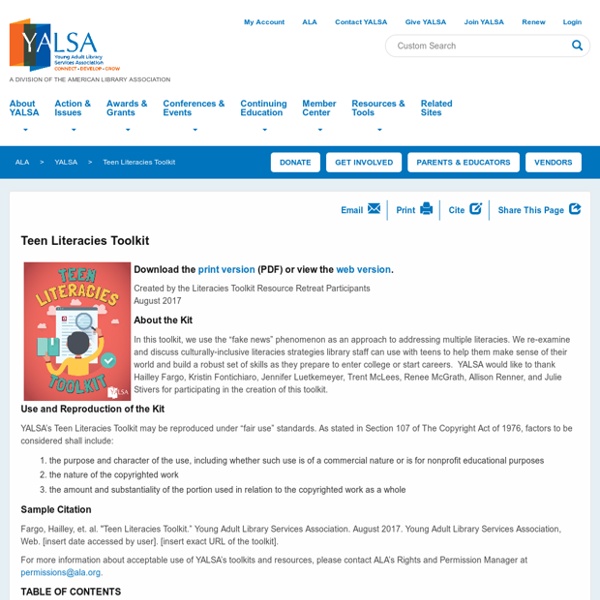NIH: Finding and Evaluating Online Resources (Maggie Y. Section 90)
What’s the Bottom Line? How much do we know about online resources for complementary health approaches? The number of Web and social media sites, along with mobile apps, offering health information about complementary and integrative health approaches (often called complementary and alternative medicine ) grows every day.
UM Library Fake News Course - David Sastre, Section 90
The slides for the LOEX 2018 session entitled Fake News, Lies, and a For-credit Class: Lessons Learned from Teaching a 7-Week Fake News Undergraduate Library Course can be seen on the right. An open Canvas version of the course is available as well. Look for a Canvas version of the course in the Commons if you are a Canvas campus.
Amy K. - S.O.S. for Information Literacy Boolean Logic Lesson
This is a 40 minute lesson that can take place in the library media center or the classroom. If it takes place in the classroom, the database searching section of the lesson may need to be modified or omitted. Introduction 1. The LMS has a large cardboard box covered with brightly-colored paper and a ribbon at the front of the instruction area.
Gallery Walk: What Shapes Information?/ Albie 90
I adapted this activity for a 100 minute first-year composition session. I had previously worked with the class for a session on evaluating news articles and fact-checking claims, but we hadn't talked much about scholarly, peer-reviewed articles. I chose several new examples appropriate for an introductory audience, such as a diagram of the steps in the peer-review process, examples of reviewer comments, and a pay-walled article.
Guide on the Side (James)
Many librarians have embraced the use of active learning in their teaching. Moving away from lectures and toward activities that get students using the skills they’re learning can lead to more meaningful learning experiences. It’s one thing to tell someone how to do something, but to have them actually do it themselves, with expert guidance, makes it much more likely that they’ll be able to do it later on their own. Replicating that same “guide on the side” model online, however, has proven difficult. Librarians, like most instructors, have largely gone back to a lecture model of delivering instruction. Certainly it’s a great deal more difficult to develop active learning exercises, or even interactivity, in online instruction, but many of the tools and techniques that have been embraced by librarians for developing online tutorials and other learning objects do not allow students to practice what they’re learning while they’re learning.
Association of College and Research Libraries Standards for Proficiencies for Instruction Librarians and Coordinators
Revised as Roles and Strengths of Teaching Librarians, approved by the ACRL Board of Directors, April 28, 2017. Approved by the ACRL Board of Directors, June 24, 2007. Introduction As the role of instruction and information literacy continues to grow in the academic library, librarians are faced with a need to develop a more focused set of skills to teach effectively in library instruction programs.
Library Database Teach-In CORA (Alyssa)
Short Description: Rather than just providing a 20min presentation on academic databases available through the library website--this lesson is designed to have students demonstrate using library databases for their classmates. Delivered to our ENG 1B (a required freshman course) students, and timed to coincide with their Argument Essay assignment, students practice accessing and utilizing databases to find information sources. Working in groups, the students explore an assigned database before coming up to the podium to demonstrate the materials, search functionality and features of that database.
Picking Your Topic
Meet Jennie. Jennie has a research project due in a few days. She picked a topic when her professor first assigned the project.
Locating Plays - Theatre & Performance Studies Research Guide - LibGuides@UMD Libraries (Casey C.)
Search for Plays by Title (Use BASIC SEARCH) Strategy #1 - Title Beginning With...



